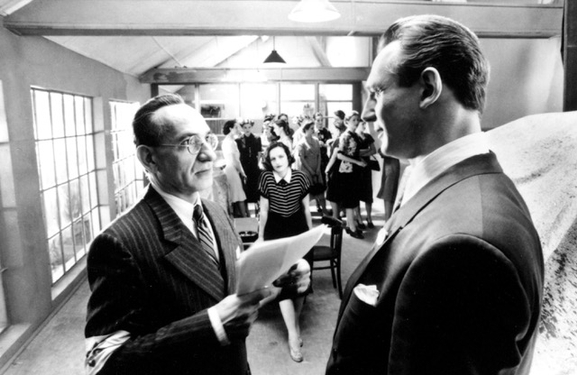In the pantheon of film critics, one beatific, bespectacled gentleman has done much more than criticize and editorialize; he’s enticed the world to follow his lead and fall deeply, madly in love with cinema. From his best-selling annual movie guides to his presence on 27 seasons of “Entertainment Tonight,” Leonard Maltin is one of Hollywood’s most trusted cinephiles.
Equal parts connoisseur, admirer and critic, Maltin and I go way back, and I don’t just mean those years circa John Tesh when Maltin was the first person I saw discuss film as an art form. During the spring semester of 1999 at the University of Southern California, I had the pleasure of spending every Thursday night under Professor Maltin’s tutelage.
While working on one of his numerous tomes (He’s currently on deadline for two new books.), filming his weekly show “Secret’s Out” for Reelz Channel, introducing movies on DirecTV, appearing on “ET” or screening and reviewing films, Maltin is also an adjunct professor at USC’s School of Cinematic Arts.
Since 1998, he’s taught the perennially popular Theatrical Film Symposium, known around campus by its course number “466.” Each week, an as-yet unreleased film is screened for the class of 365 students, after which someone involved in the film’s production, from directors to actors to editors, sits down for a conversation with Maltin and the class.
He may not remember me fervently raising my hand in the front row week after week, but that class, which I took four times, twice for credit and twice because I managed to sweet talk the TA, changed my life. Thinking back on it fondly, I’ve always wondered with so much on his plate and little vanity associated with a teaching gig, why saddle himself with another endeavor?
“I was asked,” he chuckles over the phone.
Thoughtful, articulate and exacting, Maltin is not a man who rushes to speak. During our conversation, he paused frequently, considering his response to each question rather than exploding with pontification.
He admits he was originally concerned about the demand the class might have on his time, but he quickly fell in love with how enriching it was.
“I have an insatiable curiosity about the whole process, and I learn so much every week,” he says. “First, from our filmmaking guests, of course, but also from the students; I learn what concerns them and what doesn’t, what appeals to them and what doesn’t. That’s fascinating.”
Beyond his own edification, Maltin feels a responsibility to teach greater lessons than those current Hollywood releases offer, which is why each semester’s final class is devoted to a classic film, usually one most of his students have never seen.
“I have a missionary zeal for spreading love of movies and a certain sense of appreciation for movie history,” he explains.
As for the current state of film affairs, Maltin admits Hollywood can be “deadening toward creativity,” but he says he’s consistently fortified by “smart, passionate people who find ways, somehow, to get their movies made. People who have something to say, a point of view, who persevere and have good movies to show for it.”
For a man who’s devoted his life to the investigation, appreciation and preservation of film, you have to wonder, what sparked that adoration?
“I remember my mother taking me by the hand to see Walt Disney’s Snow White and the Seven Dwarfs in the 1950s,” he recalls. “In those days, theaters didn’t clear out the auditorium between shows, they just ran the films continuously. I remember my mother leading me into the darkened theater as the movie was ending. So the first image I saw is the last shot of Snow White with the prince taking her off into the golden sun. That image is burned in my memory.”
In other words, Maltin and his beloved movies have always lived happily ever after.
For more information, visit leonardmaltin.com.
Film: Special Features
Leonard Maltin: Shares His Love of Movies with Students
By Sasha Perl-Raver

Leonard Maltin: critic, author, adjunct professor at USC.
Article posted on 6/10/2009
This article has been viewed 2347 times.











